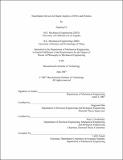Nanofluidic devices for rapid analysis of DNA and proteins
Author(s)
Fu, Jianping, Ph. D. Massachusetts Institute of Technology
DownloadFull printable version (2.031Mb)
Other Contributors
Massachusetts Institute of Technology. Dept. of Mechanical Engineering.
Advisor
Jongyoon Han.
Terms of use
Metadata
Show full item recordAbstract
Direct analysis of biologically-relevant entities such as nucleic acids and proteins offers the potential to outperform conventional analysis techniques and diagnostic methods through enhancements in speed, accuracy, and sensitivity. Nanofluidic systems with critical dimensions comparable to the molecular scale open up new possibilities for direct observation, manipulation and analysis of biomolecules (single or ensemble), thus providing a novel basis for ultra-sensitive and high-resolution sensors and medical diagnostic systems. Inspired by this concept, we have developed a new class of nanofluidic filter devices and have implemented them as controllable molecular sieves for rapid analytical separation of various physiologically-relevant molecules such as dsDNA and proteins. In addition, we have conducted theoretical studies of molecular sieving process in the context of periodic free-energy landscapes created by the patterned nanofluidic filter arrays. The kinetic model constructed based upon the equilibrium partitioning theory and the Kramers rate theory properly describes the field-dependent sieving behavior, presenting notable progress beyond the existing equilibrium model in conventional gels. (cont.) In this thesis, we have further developed a microfabricated anisotropic sieving structure consisting of a two-dimensional periodic nanofluidic filter array (anisotropic nanofilter array, ANA). The designed structural anisotropy in the ANA causes different-sized biomolecules to follow distinct migration trajectories, leading to efficient continuous-flow separation. Continuous-flow separation of dsDNA and proteins covering broad biological size scales were achieved within a few minutes, thus demonstrating the potential of the ANA as a generic molecular sieving structure for an integrated biomolecule sample preparation and analysis system.
Description
Thesis (Ph. D.)--Massachusetts Institute of Technology, Dept. of Mechanical Engineering, 2007. This electronic version was submitted by the student author. The certified thesis is available in the Institute Archives and Special Collections. Includes bibliographical references.
Date issued
2007Department
Massachusetts Institute of Technology. Department of Mechanical EngineeringPublisher
Massachusetts Institute of Technology
Keywords
Mechanical Engineering.